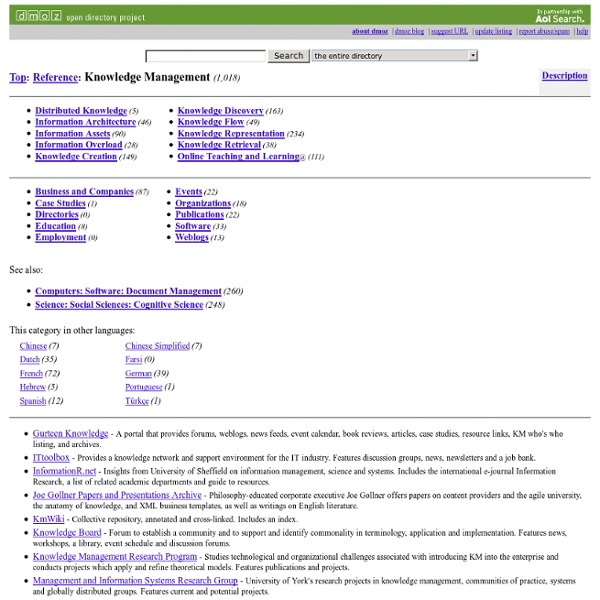



Knowledge management Knowledge management (KM) is the process of capturing, developing, sharing, and effectively using organizational knowledge.[1] It refers to a multi-disciplined approach to achieving organisational objectives by making the best use of knowledge.[2] An established discipline since 1991 (see Nonaka 1991), KM includes courses taught in the fields of business administration, information systems, management, and library and information sciences.[3][4] More recently, other fields have started contributing to KM research; these include information and media, computer science, public health, and public policy.[5] Columbia University and Kent State University offer dedicated Master of Science degrees in Knowledge Management.[6][7][8] History[edit] In 1999, the term personal knowledge management was introduced; it refers to the management of knowledge at the individual level.[14] Research[edit] Dimensions[edit] The Knowledge Spiral as described by Nonaka & Takeuchi. Strategies[edit] Motivations[edit]
Knowledge Management Tools The Momentum of Knowledge Management The Momentum of Knowledge Management Debra M. Amidon Founder and Chief Strategist, ENTOVATION® International The following paper summarises recent developments in the field of Knowledge Management. This article appeared in the May/June 1996 edition of Research-Technology Management, the journal for Industrial Research Institute (IRI). The Momentum of Knowledge Management What began almost 10 years ago - Knowledge Innovation® - has now reached the stage of a critical mass of insight. Although there has been a plethora of articles and books on the topic, the seminal cook-book (if there ever be such a thing) is only 'work-in-process.' Today, there is an emerging 'community of practice' which transcends any function, sector, industry or geography. transformation of the enterprise - profit or not-for-profit - through knowledge management. Collective findings are emerging: 1. 2. If it cannot be measured, it isn't considered of value. 3. . 4. 5. 6. 7. 8. 9. 10. Conclusions The paradigm must shift.
i-KM Management des connaissances Monitoring knowledge (management): an impossible task? « The giraffe It isn’t an impossible task to monitor/evaluate (M&E) intangibles, knowledge or knowledge management (KM), but it requires a series of tough choices in a maze of possibles. This is what Simon Hearn and myself are discovering, trying to summarise, synthesise and build upon the two M&E of KM papers commissioned earlier, as well as the reflective evaluation papers by Chris Mowles. We are still at the stage of struggling very much with how to set the ballpark for our study. So this is a good opportunity to briefly share a blogpost I wrote recently about this very topic, and to share some preliminary thoughts. If we get to engage your views it would certainly help us to get going. In attempting to monitor knowledge and/or knowledge management, one can look at an incredible amount of issues. Among the factors that seem to impact on the design (and later implementation) of M&E of KM, I would identify: Do you have any suggestion about all this? Like this: Like Loading...
Le portail du KM Se procurer MindManager Sur le BLOG du KM2.0 La carte du portail Le KM en images Depuis 1998, i-KM participe à la conception et à la diffusion d'un Knowledge Management adapté à la culture économique et organisationnelle française et francophone. - Le facteur humain, et le désir de partager la connaissance pour agir, innover, construire... - Les méthodologies pour concevoir et diffuser des approches adaptées à toutes les singularités et environnements... - L'usage, enfin, des outils, plus encore que les technologies elles-mêmes... Guident notre approche, notre investissement actif et enthousiaste dans tous ces domaines qui peuvent transformer le travail, la relation, la compétitivité des entreprises, contribuer fortement à la modernisation de l'État : pourvu qu'on leur donne du sens, que l'on forme et informe, que l'on développe une véritable culture de partage et d'innovation.
On Risk Management, Systemic Failures, and 'Black Swans: Rethinking Systemic Risk Management for Pre-empting Extreme Events aka 'Black Swans' & Systemic Failures: WWW Virtual Library on Knowledge Management and the Knowledge Management Think Tank Knowledge Management or Experience Management? One of our clients has contracted us to provide them with guidance into "Experience Management". The term "Experience Management is not a commonly defined term, so I was very interested to understand what they meant by the term (and they weren't talking about managing customer experience, which is a different field). It seems they have already investigated Knowledge Management, and have been provided with Knowledge Management solutions that deal with content management and the management of information. I think they are wisely navigating their way through the confusion around Knowledge Management; the confusion between knowledge and information, and between Knowledge Management and content management. On the one hand, according to Einstein, Knowledge is experience; everything else is information. On the other hand, there is a common model known as the DIKW model, which builds up through data and information, to knowledge, and then on to Wisdom. What does Experience Management look like?
100 Companies That Matter in Knowledge Management ABBYY — Optical character recognition, document capture and language software for both PC and mobile devices. To learn more, read ABBYY USA's CEO Dean Tang's View from the Top. Acquia — Products, services and technical support for the open source Drupal social publishing system. To learn more, read Acquia CEO Tom Erickson's View from the Top. Actuate - the Xenos Group — Intelligent information solutions that facilitate efficient structured and unstructured data transformation. Adobe — Creator of multimedia and creativity software products with emphasis on rich Internet application software development. Alfresco — Open source enterprise content management system developer for Microsoft Windows and Unix-like operating systems. Alterian — Platform combining campaign management, Web content management, e-mail and social media monitoring tools for marketers. AnyDoc Software — Automated document, data capture and classification solutions. Apple — Business and consumer software and hardware.